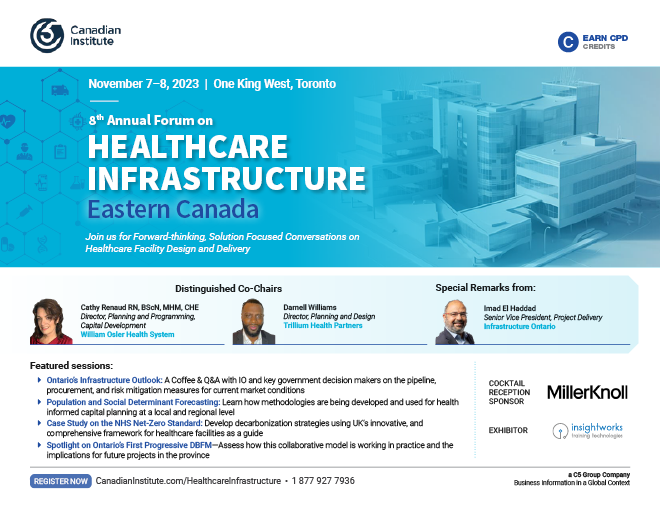2023 Agenda

Download 2023 Brochure
Flip through our 2023 conference brochure and discover what’s new this year.
- Jump to:
- At a Glance
- Day 1
- Day 2
- Print-friendly Format
Day 1 - Tuesday, November 7, 2023
| 7:45 |
Registration Opens – Coffee and Refreshments |
| 8:50 |
Co-Chairs’ Opening Remarks |
| 9:00 |
Coffee & ConversationIndustry Outlook for Healthcare Infrastructure in Ontario: Pipeline, Priorities, and Projections for the Year Ahead |
| 10:00 |
Contracting Trends in Today’s Healthcare Infrastructure Market |
| 10:45 |
Morning Coffee Break |
| 11:00 |
Establishing Standards for Private Medical and Surgical Centres in Ontario |
| 11:30 |
Lightning TalksThe Express Tour of 3 Healthcare Projects in Eastern Canada |
| 12:30 |
Lunch Break |
| 1:30 |
Exploring the Efficacy of Artful Intersections for Health and Wellness Infrastructures |
| 2:45 |
Afternoon Networking & Refreshment Break |
| 3:00 |
Evidencing the Importance of a Population and Social Determinants of Health Informed approach to Hospital Capital Planning |
| 3:45 |
Addressing Gaps in the Continuum of CareTransforming Infrastructure to Meet the Complex Medical Needs of Vulnerable Populations in the Community |
| 4:30 |
Networking Reception Sponsored by
|
Day 2 - Wednesday, November 8, 2023
Day 1 - Tuesday, November 7, 2023
| 7:45 |
Registration Opens – Coffee and Refreshments |
| 8:50 |
Co-Chairs’ Opening Remarks Cathy Renaud, RN, BScN, MHM, CHE  Darnell Williams |
| 9:00 |
Coffee & ConversationIndustry Outlook for Healthcare Infrastructure in Ontario: Pipeline, Priorities, and Projections for the Year Ahead Imad El Haddad, M.Arch, MBA  James Stewart  David Ho Moderator: Ian McDermott Grab your morning coffee and settle in for a special interactive conversation with Infrastructure Ontario, and industry partners. This session will start off with an interview style Q&A aimed at providing a clearer view of the trends shaping healthcare infrastructure in Ontario—from the pipeline, and current project pressures to projections for 2024. Afterwards we’ll dig a little deeper with your questions on process, procurement, and the future landscape for healthcare builds.
|
| 10:00 |
Contracting Trends in Today’s Healthcare Infrastructure Market Annik Forristal Owners and contractors are facing uncertainty in the market and it’s impacting timelines and budgets. This presentation will consider the key principles for project success and how project contracts are changing in response to this market uncertainty. The discussion will focus on how to use your contracts to ensure all parties are positioned to effectively navigate the bumps that inevitable arise on the road to project completion including:
|
| 10:45 |
Morning Coffee Break |
| 11:00 |
Establishing Standards for Private Medical and Surgical Centres in Ontario Stasia Bogdan  Kirsten Reite Private healthcare in Canada has been available for many years in the form of elective and cosmetic surgery however due to demand, driven in part by COVID 19 and the associated wait times, private, non-hospital medical and surgical centres are fast becoming a partner in our public system. The passage of Ontario’s health reform bill earlier this year shows a deepening commitment to this partnership by allowing more private clinics to offer select publicly funded procedures. It’s a critical time to explore standards for these clinics to ensure patient safety. This discussion will focus on:
|
| 11:30 |
Lightning TalksThe Express Tour of 3 Healthcare Projects in Eastern CanadaPeel Memorial: Thevaki Ganesharajah West Lincoln Memorial Hospital: Robert Hofmann Rockwood Terrace: Deborah Wadsworth This session will provide a snapshot of three distinctive healthcare projects that are either currently underway or recently reached completion. Each lightning talk will cover scope and timelines, and innovative design elements, as well as lessons learned during the delivery process, and post occupancy. Presentations will be followed by Q&A. |
| 12:30 |
Lunch Break |
| 1:30 |
Exploring the Efficacy of Artful Intersections for Health and Wellness Infrastructures Natalia Olszewska MD  Tye Farrow  Pia Kontos, Ph.D.  Laurie Kilgour-Walsh Moderator: Keith Francis So much of what we see is related to what we feel, and what we feel has so much to do with our understanding of humanity and the world around us. From architecture, neuroscience, music, psychology, sociology, anthropology or critical disabilities, the contributions of arts-based initiatives to healthcare and its infrastructures have become the throughline method used to uncouple, translate and answer the essential questions of WHY? and HOW? While providing a new depth of understanding of the complexities of health and wellness themes, the endless possibilities of creative expression and the design of space and place. Join a diverse panel of applied practitioners, pioneers, and advocates for an extended roundtable discussion that will touch on:
|
| 2:45 |
Afternoon Networking & Refreshment Break |
| 3:00 |
Evidencing the Importance of a Population and Social Determinants of Health Informed approach to Hospital Capital Planning Jana Fear, MLIS  Andrea McInerney Situated in London, the fastest growing city in the province, and 3rd fastest growing city in Canada, LHSC is the single acute care hospital for the local community. LHSC currently serves a total population of more than a million in Southwestern Ontario for specialty acute care. Like many Academic Health Science Centres around the world, LHSC is playing an increased role in population health and equity. This session will focus on SDH risk informed methodologies currently being used at LHSC for volume forecasting:
|
| 3:45 |
Addressing Gaps in the Continuum of CareTransforming Infrastructure to Meet the Complex Medical Needs of Vulnerable Populations in the Community Patsy Poulin  Larissa Smit Gaps exist in the continuum of care for individuals with disabilities and complex medical conditions. Family members provide care where they can but are often left looking to an overstretched Long Term Care system to help. Savehaven, an organization that provides day programming, respite and residential care for children, youth and adults is working with Cumulus Architects to reimagine the physical space in a way that will help fill the gaps that exist. In this session explore how the redevelopment of Safehaven’s Bloor Street site will:
|
| 4:30 |
Networking Reception Sponsored by
|
Day 2 - Wednesday, November 8, 2023
| 7:45 |
Registration Opens and Continental Breakfast Served |
| 8:50 |
Co-Chairs’ Opening Remarks Cathy Renaud, RN, BScN, MHM, CHE  Darnell Williams |
| 9:00 |
Embedding Indigenous Knowledge, Traditional Healing Practices and Cultural Safety & Humility into Healthcare Planning and Project Delivery Andrew Koscielniak, R. Kin, MA
|
| 9:30 |
Delivering Care in the Future: The Journey to a New Digital HospitalModerator: Jeannie Gandham The New St. Paul’s Hospital, an entirely new build of a downtown Vancouver hospital, will be the most digitally innovative hospital in Western Canada. The technology strategy for the project’s IT Program is a balance between innovation and digital equity to ensure a positive impact for patients and providers. This discussion will focus on how the project is adapting to emergent needs and how infrastructure has been planned to support and enable rapid changes in healthcare.
|
| 10:30 |
Morning Coffee and Networking Break |
| 10:45 |
Special Focus on Digital EnablementInterpreting the CSA Digital Infrastructure Standard for Healthcare Facilities Christine Chadwick  Mathieu LeBreton, RN, BScN, MScHQ The integration of digital infrastructure is an increasingly important, and complex consideration for both new and existing healthcare facilities. It can be difficult to know where to start in such a rapidly evolving technological landscape and how to identify the best approach for your organization. The CSA has released a first draft of a new standard published for public review that will provide a framework for the adoption technologies. Points of discussion include:
|
| 11:30 |
Testing and Operationalizing Technology: Strategies for Smoothing Out the Transition to a New Healthcare Facility Langdon Baker  Shelley Darling  Maria Aquino, RN, MHI  Soraya Visram, RN BScN MHI Building off our previous session—presenters will provide case study examples of recent technology implementation projects at healthcare facilities in Eastern Canada. Key points to be covered:
|
| 12:30 |
Lunch Break |
| 1:30 |
Navigating IPAC Standards and the Productive Tensions that Arise During Planning and Construction Jessica Fullerton  Marianne Lee, P.Eng., ing., LEED AP  Peter Duckworth-Pilkington, B.E.S., B.Arch. Moderator: Cathy Renaud, RN, BScN, MHM, CHE Healthcare facility planning involves many, sometimes competing or conflicting considerations ranging from environmental and sustainability measures to infection control and patient safety. This session will examine the decision-making process behind some of the tough decisions and how a holistic perspective for all parties helps pave the way to solutions. |
| 2:30 |
Afternoon Networking and Refreshment Break |
| 3:00 |
Enabling Action on Climate ChangeA Case Study from the NHS Net Carbon Standard Rebecca Stubbs The climate emergence is a health emergency. As embodied carbon of materials and construction processes typically accounts for upwards of 70% of whole lifecycle carbon emissions from a hospital, acting on embodied carbon emissions never seemed more pertinent. In this session examine how the UK is tackling the challenge by influencing maturity of the market by generating data and creating a framework of measurement and moving towards true net-zero healthcare facilities across their lifecycle.
|
| 3:30 |
Examining the Benefits of Managing MES Projects In-House: Key Takeaways from the HHS Journey to Replace its Diagnostic Equipment Fleet George Pankiw  Diego Gomez
|
| 4:15 |
Conference Concludes |
